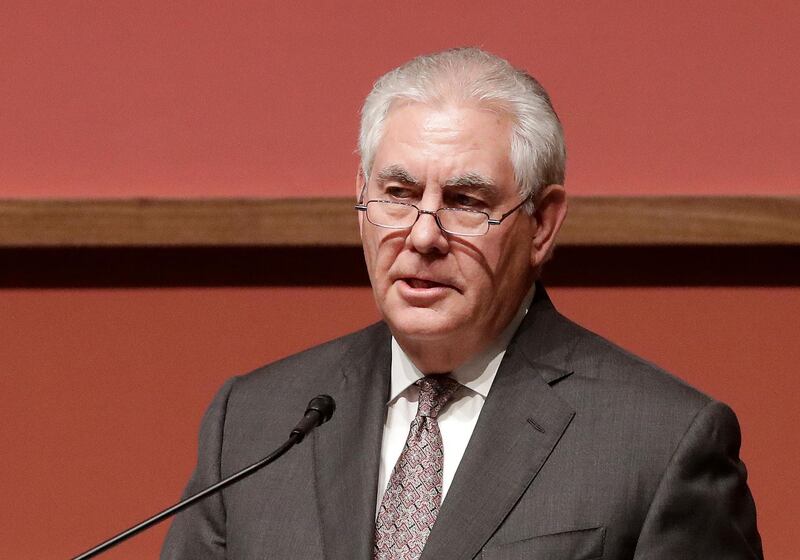Undercutting Iran’s influence in Syria has emerged as a central goal for the Trump administration as it laid out its new political and military strategy for the ongoing conflict.
In a speech from the Hoover Institution in California, US secretary of state Rex Tillerson called Iran a “strategic threat”, adding that a diminished Iranian influence is a one of five primary goals for the administration in Syria.
Mr Tillerson, speaking after a months’ long review that the Trump team initiated on Syria, presented the US vision for securing its interests and attempting to end the conflict.
“For nearly fifty years, the Syrian people have suffered under the dictatorships of Hafez Al Assad, and his son Bashar Al Assad,” Mr Tillerson said, describing the regime in Damascus as “malignant” as “its sponsors Iran”.
The secretary of state linked the Syrian government to terror organisations, saying: “It has empowered groups that kill American soldiers, such as Al Qaeda in Iraq. It has backed Hizbollah and Hamas.”
Mr Tillerson said Bashar Al Assad had a grand strategy beyond his own survival, which “includes hosting some of the most radical terrorist elements in the region, and using them to destabilise neighbouring countries”.
The National reported last month that two Congressmen — one Democrat and one Republican — have sent a letter to the US Department of Justice asking to open a case against Mr Assad for his alleged role in targeting American troops by supporting and harbouring extremists.
_______________
Read more:
[ Tillerson and Saudi foreign minister Jubeir meet in Washington ]
[ US Government imposes new sanctions on Iran as protests continue ]
_______________
While hailing the US successes in defeating ISIL in Iraq and Syria, Mr Tillerson said that “continued strategic threats to the US other than ISIS persist. I am referring principally to Iran”.
He described a more robust Iranian presence by spending billions of dollars and “deploying Iranian Revolutionary Guard troops; supporting Lebanese Hizbollah; and importing proxy forces from Iraq, Afghanistan, Pakistan, and elsewhere.” This strengthened role allows Iran “to extend its track record of attacking U.S. interests, allies, and personnel in the region,” he said.
In the new strategy, Mr Tillerson laid out five goals for the United States. First, the defeat of ISIL and Al Qaeda and secondly, resolving the conflict by working with Russia through a UN-led political process that would lead to a functioning unified state "post-Assad leadership".
The third goal is to see "Iranian influence in Syria diminished, and Syria's neighbours are secure from all threats emanating" from the country.
Fourth, “conditions are created so that refugees can begin to safely and voluntarily return to Syria” and fifth that “Syria is free from weapons of mass destruction”.
While the speech did not lay out the exact tools and leverage that the US will use in securing such goals, it presented a path for a long military presence in Syria.
“Our military mission in Syria will remain conditions-based, and focused on ensuring ISIL cannot re-emerge” Mr Tillerson said. “We cannot repeat the mistake of 2011 [Iraq withdrawal].”
The US military presence will be in areas liberated from ISIL.
Mr Tillerson, in a warning to the Assad regime, said: "Territory liberated from ISIS and Al Qaeda must not be ceded to, or retaken by, Bashar Al Assad and his regime."
Last month, the US defence department acknowledged for the first time the presence of about 2,000 US troops deployed in Syria, a number that is almost four times the size of the 503 troops that were provided for the last year.
Nicholas Heras, a senior fellow at the Center for New American Security told The National, that Mr Tillerson speech brings two new strategic elements to the US role in Syria.
First “the Trump administration is making a declaration: the Syrian civil war will only end when Iran has been removed from Syria.” Second, that “the Trump team will keep the US military inside of Syria, however long it takes, to ensure its goals are met.”
“Unlike the Obama administration, the Trump team is making the clear connection that Iran's presence in Syria is the cause of instability that empowers Salafist jihadists that threaten the national security of the United States,” Mr Heras added.
It remains unclear how the administration is willing to achieve its goals, with Mr Tillerson's speech stopping short at offering details on tactics to counter Iran or to achieve a political solution in Syria.







